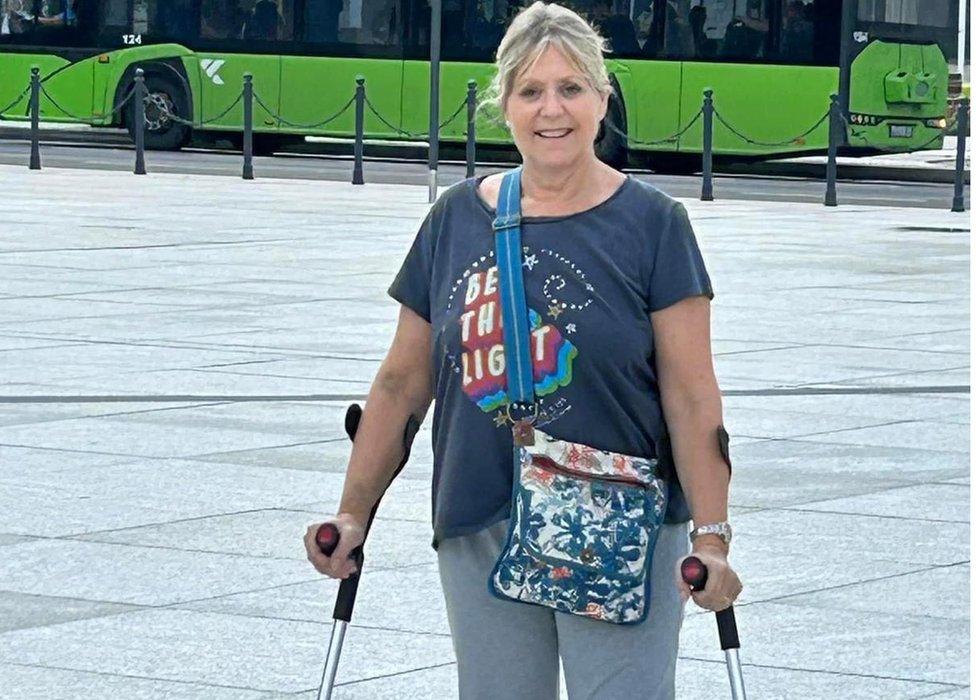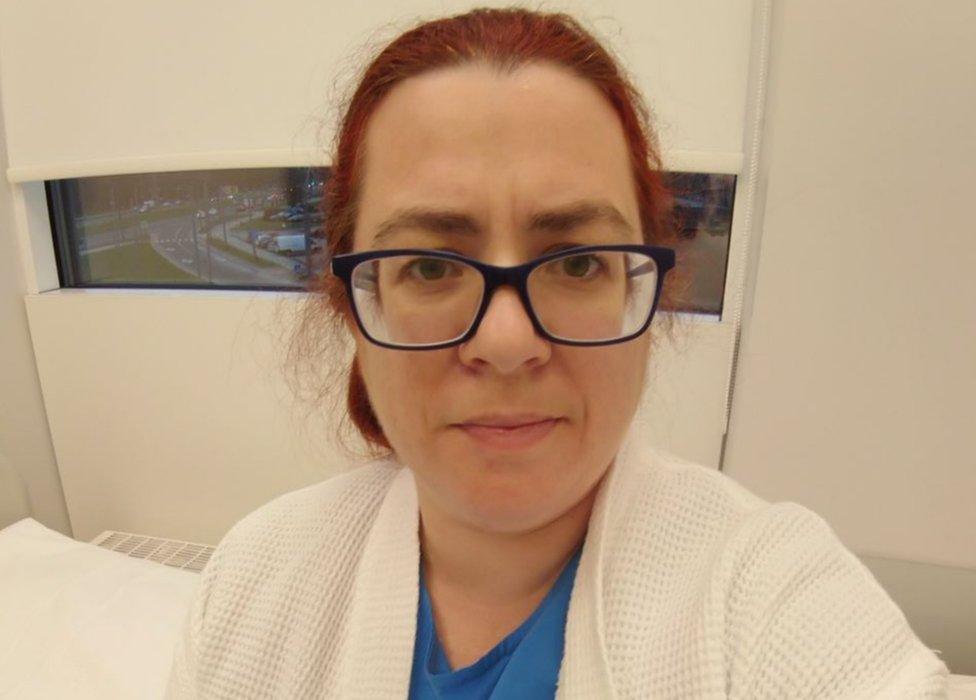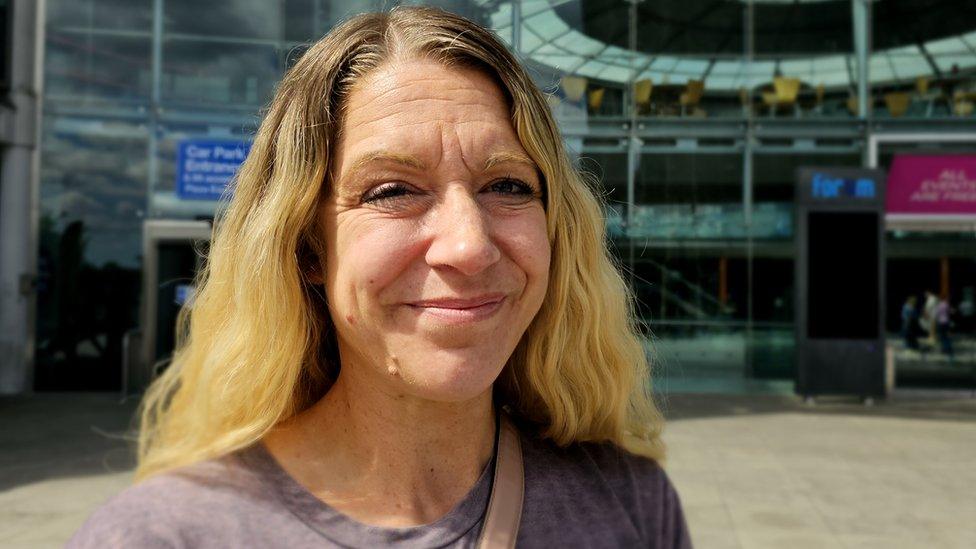NHS waiting lists: Why I went abroad for quicker treatment
- Published

Available data is suggesting more people are going abroad for medical surgery
The number of patients choosing to go abroad for medical surgery have increased from 152,000 in 2018 to 234,000 in 2021, according to Office for National Statistics data. It comes as NHS waiting lists have reached a record high of 7.75 million. Two women explain why they travelled to Lithuania to skip a two-year wait for treatment.
'A bit drastic and a bit scary really'

Annabel Harris went abroad for a hip replacement after being unable to sustain the pain and a possible two-year wait
Annabel Harris underwent a hip operation abroad in July.
She had been told in April that she would have to wait up to three months for an X-ray, and up to two years for replacement surgery at her local hospital, external.
The 58-year-old, from Little Dunham near Fakenham, Norfolk, said: "I couldn't stand, I couldn't sit, every movement hurt.
"It was hard to walk, I couldn't drive a car or anything."
Mrs Harris had her X-Ray at a UK private hospital and was told an operation would cost in the region of £17,000.
Her mother recommended a clinic in Lithuania after hearing about the experience of her dentist who had had a hip replacement there.
"The cost was one factor, and the other factor was once you'd submitted X-Rays and reports to the clinic in Lithuania, you can be there in about two weeks time," she said.
In the end she spent about £7,000 on the surgery and two weeks of physiotherapy.
Mrs Harris carried out a lot of research before settling on the Lithuania team which she described as "brilliant".
The legal secretary said making her decision seemed "a bit drastic and a bit scary really".
"But you get to the point, that desperate position, when you can't wait two years, or perhaps the other issue of finding £17,000 and taking out a loan."
'They were just absolutely beyond capacity'

Fiona Hinton who faced the prospect of losing her job paid for a private gall bladder operation in Lithuania as she could not afford to wait for a NHS surgery
Primary school teacher Fiona Hinton had a problem with her gall bladder and had been suffering pain "worse than childbirth" since 2022.
She was placed on the urgent NHS waiting list "which was extremely long" for an operation to remove her gall bladder.
"I was warned it might take 18 months to two years," she said.
Acute pain and being blue-lighted by ambulance to hospital on two occasions, extended time off from work which meant her salary would be halved, or being made redundant on health grounds, saw her opting for the private route.
The price was a third of the cost of a UK private clinic.

Fiona Hinton said staff were at capacity in the NHS and described it as broken
"They ask you to stay for so many days afterwards, and I saw the consultant afterwards," she said.
"I then had a nurse check-up for five days and then I flew back, with an aftercare plan and phone calls.
"Amazing level of care out there, can't fault them."
A single mother, Ms Hinton, who lives in Higham near Norwich, said she feels "very mixed" about her experience.
"We have this amazing NHS but it's rupturing at the seams, it can't cope.
"Everything I'd seen when I had my NHS appointments was not that people didn't care. People did care, they were just absolutely beyond capacity."
The ONS data showed numbers from the UK going abroad for medical treatment increased from 152,000 in 2018 to 248,000 in 2019.
In 2021, post-Covid, when people faced restricted travel, some 234,000 people went overseas for medical treatment.
Both Mrs Harris and Ms Hinton attended the Nord Clinic in Lithuania.
It said: "If we compare the number of orthopaedics patients from the UK, this year we expect to treat around 700 orthopaedic patients from the UK. We have a growth of 25-30 % every year."
The most common reason cited was "long waiting time in their home country," a spokeswoman said.
Not 'always' excellent care
Prof Fiona Myint, senior vice president of the Royal College of Surgeons of England, said: "RCS England is aware, anecdotally, of an increase in patients choosing to go abroad for surgery.
"Some will do so to avoid long NHS waiting lists for operations such as hip and knee replacements.
"A lot of clinics and hospitals abroad will offer an excellent level of care. However, this is not always the case.
"While surgery abroad might be a cheaper option, I would urge patients to consider any cost savings against the possible risks of complications after having surgery outside of the UK."
The RCS urged people to "carefully research providers and understand the care that you will receive before and after the operation".
The Department of Health said: "Cutting waiting lists is one of the government's top five priorities and we are taking action to shorten long waits."
The government has pledged to eliminate all waits of more than a year by March 2025.
Previously, the government has warned industrial action, including doctor strikes, was making it "more challenging" to bring down waits.

Follow East of England news on Facebook, external, Instagram, external and X, external. Got a story? Email eastofenglandnews@bbc.co.uk, external or WhatsApp us on 0800 169 1830
- Published12 October 2023

- Published10 August 2023
